Monographs
The Government of Things
Foucault and the New Materialisms
Materialism, a rich philosophical tradition that goes back to antiquity, is currently undergoing a renaissance. In The Government of Things,
Thomas Lemke provides a comprehensive overview and critical assessment
of this “new materialism". In analyzing the work of Graham Harman, Jane
Bennett, and Karen Barad, Lemke articulates what, exactly, new
materialism is and how it has evolved. These insights open up new spaces
for critical thought and political experimentation, overcoming the
limits of anthropocentrism.
Drawing on Michel Foucault's concept
of a “government of things", the book also goes beyond new materialist
scholarship which tends to displace political questions by ethical and
aesthetic concerns. It puts forward a relational and performative
account of materialities that more closely attends to the interplay of
epistemological, ontological, and political issues.
Lemke
provides definitive and much-needed clarity about the fascinating
potential—and limitations—of new materialism as a whole. The Government of Things revisits
Foucault's more-than-human understanding of government to capture a new
constellation of power: “environmentality". As the book demonstrates,
contemporary modes of government seek to control the social, ecological,
and technological conditions of life rather than directly targeting
individuals and populations. The book offers an essential and much
needed tool to critically examine this political shift.
Thomas Lemke: The Government of Things. Foucault and the New Materialisms. New York: NYU Press 2021.
Neue Materialismen zur Einführung
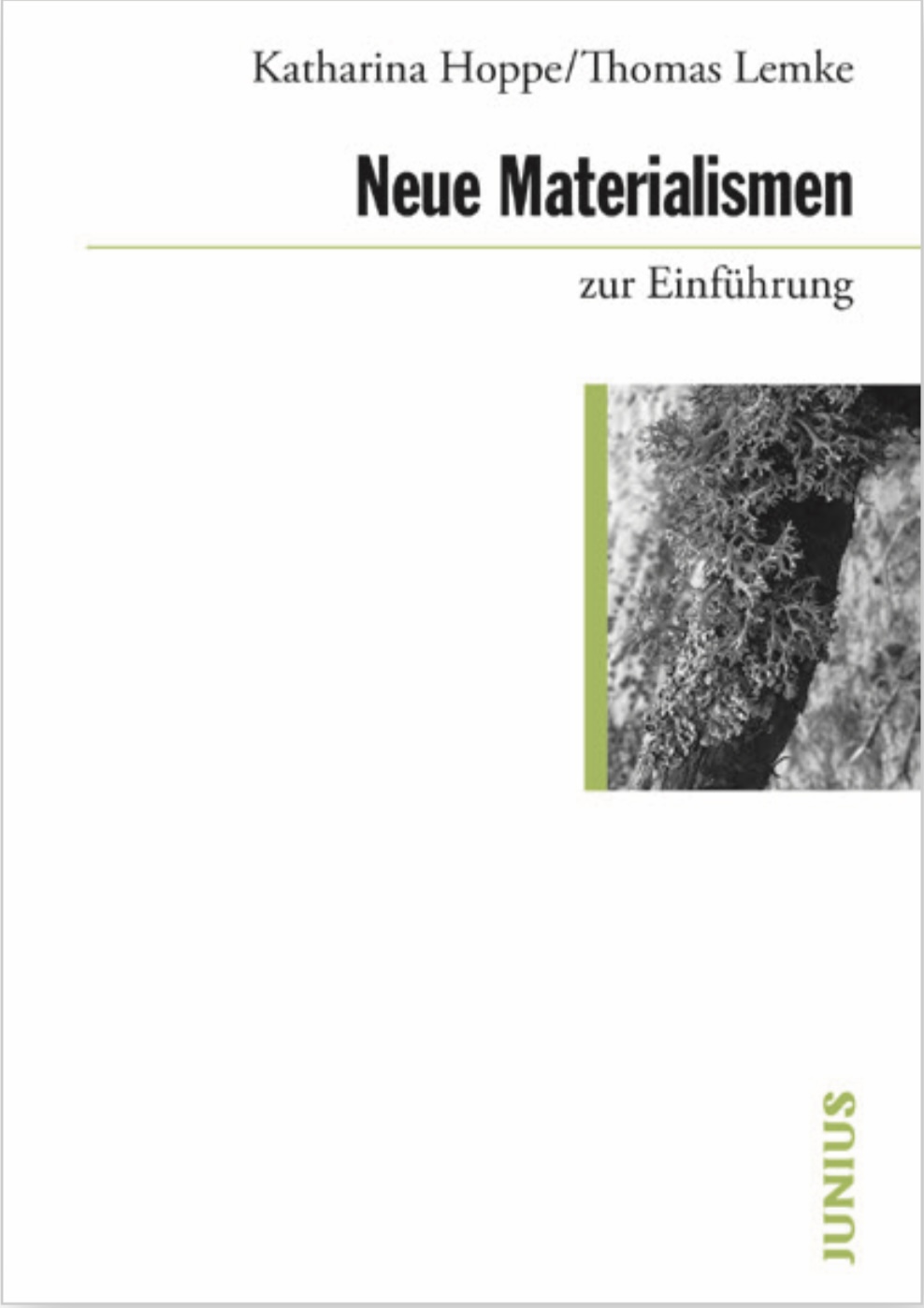
Katharina Hoppe and Thomas Lemke
For the past twenty years or so, an important shift in emphasis has been taking place in the cultural and social sciences: Materialities, objects, and artifacts are receiving increasing scholarly attention and are being reconceptualized. Central to this are the so-called New Materialisms, which examine the dynamic interplay of meaning processes and material assemblages. This introductory volume offers the first overview of central strands of debate in this research perspective. It introduces important representatives of neo-materialism such as Jane Bennett, Karen Barad, Rosi Braidotti, and Donna Haraway and shows its innovative potential as well as analytical inconsistencies and conceptual voids.
Lemke, T. & Hoppe, K. (2021). Neue Materialismen zur Einführung, Hamburg: Junius Verlag.
Reproduktion und Selektion
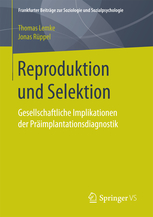
Gesellschaftliche Implikationen der Präimplantationsdiagnostik
Lemke, T. & Rüppel, J. (2017). Reproduktion und Selektion. Gesellschaftliche Implikationen der Präimplantationsdiagnostik, Wiesbaden: Springer VS.
Perspectives on Genetic Discrimination
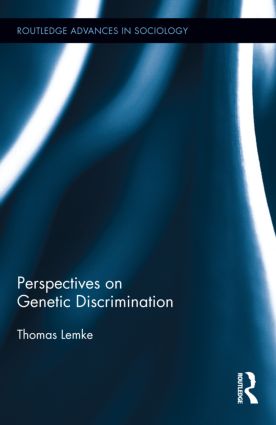
Over the past 15 years, a series of empirical studies in different countries have shown that our increasing genetic knowledge leads to new forms of exclusion, disadvantaging and stigmatization. The spectrum of this "genetic discrimination" ranges from disadvantages at work, via problems with insurance policies, to difficulties with adoption agencies.
The empirical studies on the problem of genetic discrimination have not gone unnoticed. Since the beginning of the 1990s, a series of legislative initiatives and statements, both on the national level and on the part of international and supranational organizations and commissions, have been put forward as ways of protecting people from genetic discrimination.
This is the first book to critically evaluate the empirical evidence and the theoretical usefulness of the concept of "genetic discrimination." It discusses the advantages and limitations of adopting the concept, and offers a more complex account distinguishing between several dimensions and forms of genetic discrimination.
Lemke, T. (2013). Perspectives on Genetic Discrimination, New York/London: Routledge.
Die Natur in der Soziologie
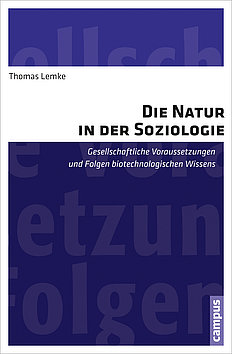
Gesellschaftliche Voraussetzungen und Folgen biotechnologischen Wissens
Lemke, T. (2013). Die Natur in der Soziologie. Gesellschaftliche Voraussetzungen und Folgen biotechnologischen Wissens, Frankfurt am Main/New York: Campus.
Foucault, Governmentality, and Critique
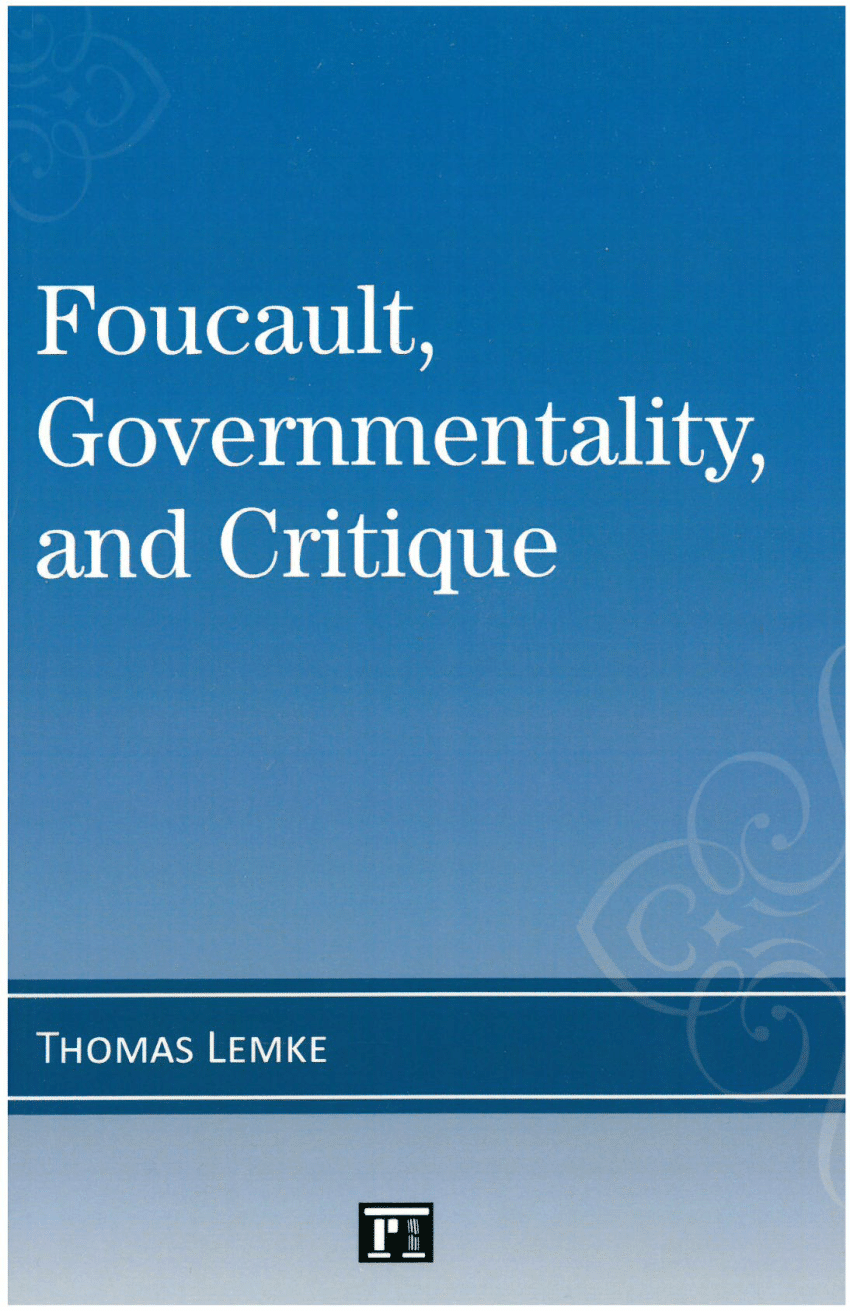
Michel Foucault is one of the most cited authors in social science. This book discusses one of his most influential concepts: governmentality. Reconstructing its emergence in Foucault's analytics of power, the book explores the theoretical strengths the concept of governmentality offers for political analysis and critique.
It highlights the intimate link between neoliberal rationalities and the problem of biopolitics including issues around genetic and reproductive technologies. This book is a useful introduction to Foucault's work on power and governmentality suitable for experts and students alike.
Lemke, T. (2011). Foucault, Governmentality, and Critique, Boulder, CO/London: Paradigm Publishers.
Übersetzungen in andere Sprachen
- Lemke, T. (2015). Türkische Übersetzung: Foucault, Yönetimsellik ve Devlet, übersetzt von Utku Özmakas, Ankara: Pharmakon.
- Lemke, T. (2017). Portugiesische Übersetzung: Foucault, Governamentalidade e Crítica, übersetzt von Eduardo A. Camargo Santos und Mario Marino, São Paulo: Editora Politeia.
Der medizinische Blick in die Zukunft
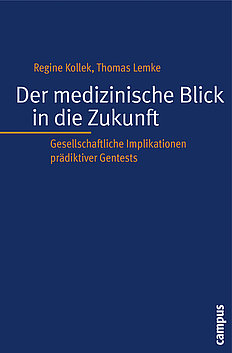
Gesellschaftliche Implikationen prädiktiver Gentests
Kollek, R. & Lemke, T. (2008). Der medizinische Blick in die Zukunft. Gesellschaftliche Implikationen prädiktiver Gentests, Frankfurt am Main/New York: Campus.
Gouvernementalität und Biopolitik
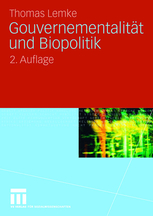
Biopolitics
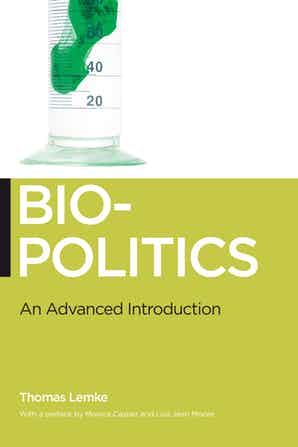
An Advanced Introduction
The biological features of human beings are now measured, observed, and understood in ways never before thought possible, defining norms, establishing standards, and determining average values of human life.
While the notion of “biopolitics” has been linked to everything from rational decision-making and the democratic organization of social life to eugenics and racism, Thomas Lemke offers the very first systematic overview of the history of the notion of biopolitics, exploring its relevance in contemporary theoretical debates and providing a much needed primer on the topic.
Thomas Lemke explains that life has become an independent, objective and measurable factor as well as a collective reality that can be separated from concrete living beings and the singularity of individual experience. He shows how our understanding of the processes of life, the organizing of populations and the need to “govern” individuals and collectives lead to practices of correction, exclusion, normalization, and disciplining. In this lucidly written book, Lemke outlines the stakes and the debates surrounding biopolitics, providing a systematic overview of the history of the notion and making clear its relevance for sociological and contemporary theoretical debates.
Lemke, T. (2011). Biopolitics. An Advanced Introduction, translated
by Eric Frederick Trump, New York/London: New York University Press.
English translation of: Lemke, T. (12007, 22013). Biopolitik zur Einführung, Hamburg: Junius Verlag.
Translations (based on German version)
- Lemke, T. (2009). Danish translation: Biopolitik. En introduktion, translated by von Lars Christiansen, Kopenhagen: Hans Reitzel Forlag.
- Lemke, T. (2010). Polish translation: Biopolityka, translated by Tomasz Dominiak, Warschau: Wdawnictwo Sic!.
- Lemke, T. (2013). Turkish translation: Biyopolitika, translated by Utku Özmakas, Istanbul: Iletişim.
- Lemke, T. (2015). Korean translation: What is Biopolitics? translated by Sung-bo Shim, Seoul: Greenbee.
- Lemke, T. (2017). Spanish translation: Introducción a la biopolitica, translated by Lidia Tirado Zedillo, Mexico City: Fondo de Cultura Económica.
- Lemke, T. (2017). Persian translation: Biopolitics: An Advanced Introduction, translated by Mastaneh Farnam. Teheran: Rowzaneh Publishing House.
- Lemke, T. (2018). Portuguese translation: Biopolitíca: críticas, debates e perspectivas, translated by Eduardo A. Camargo Santos, São Paulo: Editora Politeia.
Die Polizei der Gene
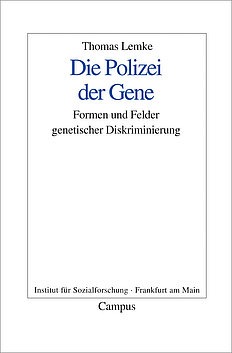
Formen und Felder genetischer Diskriminierung
Lemke, T. (2006). Die Polizei der Gene. Formen und Felder genetischer Diskriminierung, Frankfurt am Main/New York: Campus.
Dossier: Marx et Foucault

Giacomelli, M. E., Jessop, B., Le Blanc, G., Legrand, S., Lemke, T. & Montag, W. (2004). Dossier: Marx et Foucault. Actuel Marx 36.
Translations
- Lemke et al. (2006). Spanische Übersetzung: Marx y Foucault, übersetzt von Heber Cardoso und Elena Marengo, Buenos Aires: Nueva Visión.
- Lemke et al. (2007). Chinesische Übersetzung: Makesi yu Fuke, übersetzt von Yuan Chen, Shanghai: East China Normal University Press.
Veranlagung und Verantwortung

Genetische Diagnostik zwischen Selbstbestimmung und Schicksal
Lemke, T. (2004). Veranlagung und Verantwortung. Genetische Diagnostik zwischen Selbstbestimmung und Schicksal, Bielefeld: transcript Verlag.
Organisation in der modernen Gesellschaft

Eine historische Einführung
Bruch, M., Lemke, T. & Türk, K. (12002, 22006). Organisation in der modernen Gesellschaft. Eine historische Einführung, Wiesbaden: Westdeutscher Verlag.
A Critique of Political Reason
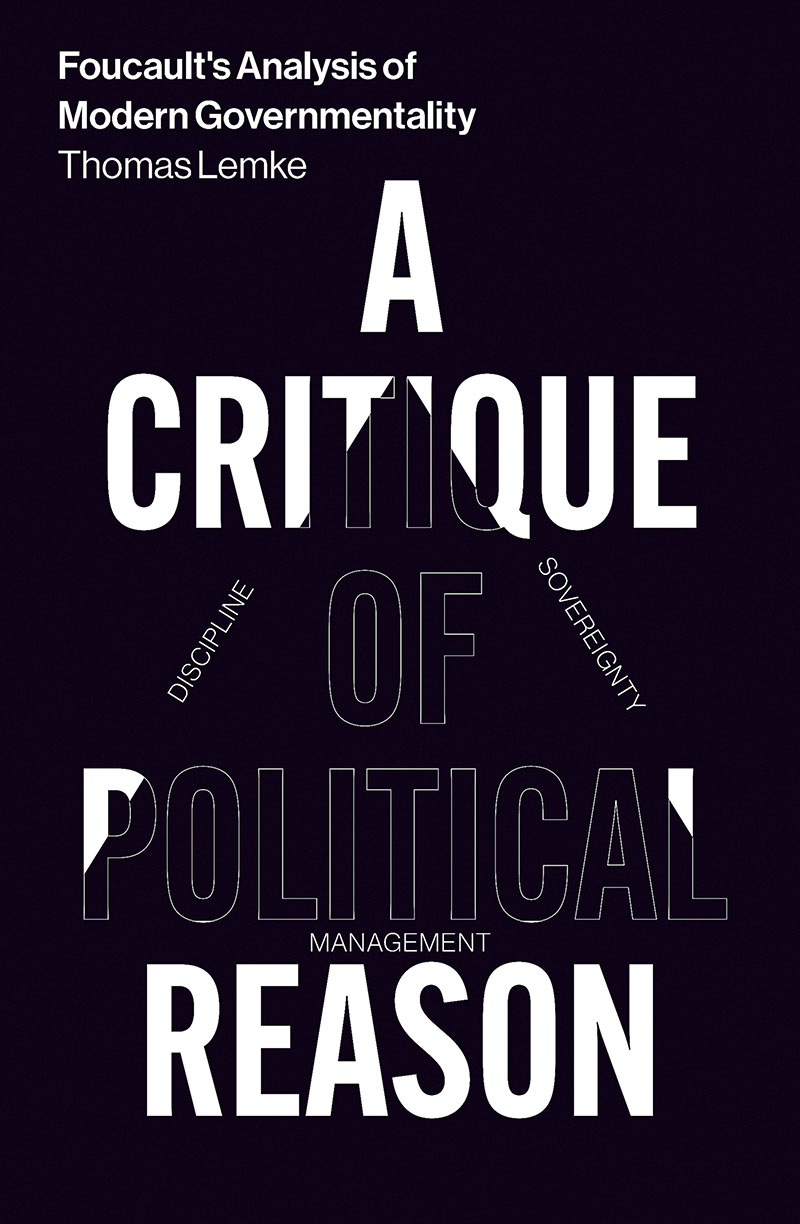
Foucault’s Analysis of Modern Governmentality
Thomas Lemke offers the most comprehensive and systematic account of Michel Foucault’s work on power and government from 1970 until his death in 1984. He convincingly argues, using material that has only partly been translated into English, that Foucault’s concern with ethics and forms of subjectivation is always already integrated into his political concerns and his analytics of power.
The book also shows how the concept of government was taken up in different lines of research in France before it gave rise to “governmentality studies” in the anglophone world.
A Critique of Political Reason provides a clear and well-structured exposition that is theoretically challenging but also accessible for a wider audience. Thus, the book can be read both as an original examination of Foucault’s concept of government and as a general introduction to his “genealogy of power’.
Lemke, T. (2019). A Critique of Political Reason. Foucault’s Analysis
of Modern Governmentality, translated by Erik Butler, London: Verso.
English translation of: Lemke, T. (11997, 21998, 32002, 42003, 52011). Eine Kritik der politischen Vernunft – Foucaults Analyse der modernen Gouvernementalität, Hamburg/Berlin: Argument.
Translations (based on German version)
- Lemke, T. (2016). Turkish translation: Politik Aklın Eleştirisi: Foucault'nun Modern Yönetimsellik Çözümlemesi, translated by Özge Karlik, Ankara: Phoenix Publisher.
- Studying at Goethe University
- International applicants
- Faculties
- Overview of study programmes
- Programme for refugees
- GRADE
- Goethe Business School (continuing education)
- Research at Goethe University
- Scientific news
- Goethe Welcome Center (for international researchers)
- Collaborative research projects
- Individual research
- Visiting fellowships
- Endowed chairs
- About the University
- News-in-brief
- University administration
- Campus locations
- Campus life
- University archives (German)
- Rhine-Main-Universities





